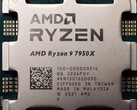It’s not too long before AMD will unleash Zen 4 properly upon us for sale and yet another benchmark appearance by a Ryzen 7000 desktop processor has suggested it will be a positive launch for Team Red. The 16-core, 32-thread high-end Ryzen 9 7950X was picked out of the Sandra database by APISAK, and it has amassed some very healthy scores in the Processor Multi-Media tests (see screenshots below). The same dataminer that shared the database entry also compared the results with those by an AMD Ryzen 9 5950X, with the Multi-Media Quad Int results showing a +118.56% difference in favor of the Zen 4 chip (Ryzen 9 7950X: 439.30 Mpix/s vs. Ryzen 9 5950X: 201 Mpix/s). With that kind of generational improvement, it appears we can just say Zen 4 is a massive success and Zen 3 is no longer relevant.
However, it is worth taking a deeper look into this particular benchmark appearance for the Ryzen 9 7950X as the above presumption isn’t particularly accurate or transparent. For a start, there are over 500 records for the Ryzen 9 5950X in the Processor Multi-Media benchmark alone. Fortunately, it is possible to compare the average score of those Zen 3 chips with the current score of the Zen 4 processor, and it makes for positive reading for the AMD Ryzen 9 7950X. The average score for the Ryzen 9 5950X with 21 CU average capacity, as the 16 CU average score is very low, is listed as 2,159.64 Mpix/s, while the Ryzen 7000 chip secures a result of 3,839.47 Mpix/s (16 CU capacity), which is a generous +77.78% difference. This should be enough to have bells tolling around the world announcing that a new desktop CPU champion has arrived, but it doesn’t consider TDP differences.
The Zen 3 Ryzen 9 5950X (3.4-4.9 GHz) could rely on a TDP of 105 W and AMD has now upped that to 170 W for the Ryzen 9 7950X (4.5-5.7 GHz). So, with the extra power and higher clock rates, the Zen 4 processor should be scoring way beyond what the Ryzen 9 5950X can manage, but when it comes down to efficiency it is possible the much-higher TDP could leave the Ryzen 9 7950X wanting. However, some calculation based on the above Mpix/s figures produces this simplified but promising news: The Zen 3 chip offered 20.57 Mpix/s per watt while the Zen 4 part seemingly produces 22.59 Mpix/s per watt in this scenario. For lovers of percentage differences, this places the AMD Ryzen 9 7950X an acceptable +9.82% ahead of its predecessor. Of course, there are caveats to be kept in mind, such as this being a potential maximum performance compared to an aggregate score. But it does appear that AMD hasn’t just whacked up the power levels without considering efficiency for Zen 4.
Source(s)
SiSoftware (1/2) & @TUM_APISAK


 Deutsch
Deutsch English
English Español
Español Français
Français Italiano
Italiano Nederlands
Nederlands Polski
Polski Português
Português Русский
Русский Türkçe
Türkçe Svenska
Svenska Chinese
Chinese Magyar
Magyar























